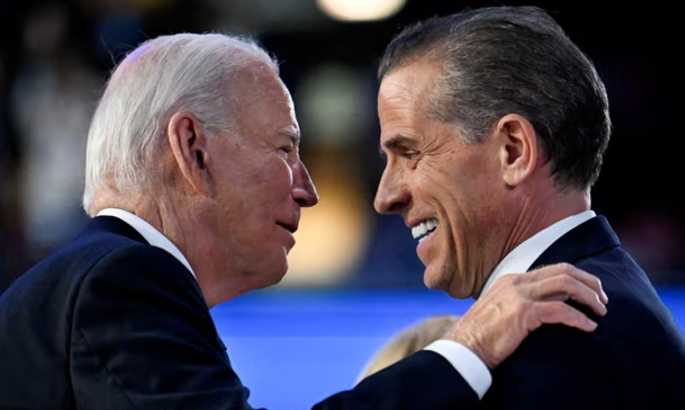(Al Jazeera Media Network) US President Joe Biden has pardoned his son, Hunter Biden, who was facing sentencing for criminal cases related to tax evasion and the purchase of a firearm.
Here is what we know about the case and the pardon:
Hunter Biden is Joe Biden’s 54-year-old middle child. He is also his only surviving son and the first child of a sitting US president to face criminal trial.
In a 2021 memoir, Hunter and to crack cocaine use and alcoholism, although he said he received treatment and recovered from his addictions.
Hunter faced the possibility of years in federal prison due to multiple charges related to gun possession and tax fraud.
In June, he was convicted by a jury for illegally purchasing and possessing a gun while being a drug user. Hunter had the .38 calibre Colt Cobra Special for approximately 11 days and never fired it, according to his lawyers.
Months later, in September, he pleaded guilty to charges of a scheme to avoid paying at least $1.4 million in taxes.
For the tax case, he faced up to 17 years in prison, and the gun charges were punishable by up to 25 years. Still, Hunter was expected to receive a shorter sentence, and it was possible he could have avoided prison time entirely.
Hunter Biden was supposed to be sentenced on December 12 on the gun-related charges in Delaware and on December 16 on the tax charges in California.
In June, Joe Biden ruled out a pardon or commutation for his son. “I abide by the jury decision. I will do that and I will not pardon him,” Biden said as his son was facing trial in the Delaware gun case.
Separately, White House Press Secretary Karine Jean-Pierre said at least seven times – over more than a year – that Biden would not pardon his son.
“No one is above the law,” he wrote on X in early July, in seeming protest against the US Supreme Court verdict granting broad immunity to Trump for any legal violations he committed while president.
In a statement by the White House on Sunday, Biden announced his decision to grant executive clemency to Hunter.
Biden explained that this decision was made in response to what he described as a politically motivated attack orchestrated by his opponents, to damage his reputation.
“The charges in his cases came about only after several of my political opponents in Congress instigated them to attack me and oppose my election,” Biden said in the statement.
“No reasonable person who looks at the facts of Hunter’s cases can reach any other conclusion than Hunter was singled out only because he is my son – and that is wrong.”
Biden also said: “I believe in the justice system, but as I have wrestled with this, I also believe raw politics has infected this process and it led to a miscarriage of justice. … I hope Americans will understand why a father and a President would come to this decision.”
Hunter said in a statement he would never take the reprieve “for granted”.
“I have admitted and taken responsibility for my mistakes during the darkest days of my addiction – mistakes that have been exploited to publicly humiliate and shame me and my family for political sport,” he said in a statement.
“I will never take the clemency I have been given today for granted and will devote the life I have rebuilt to helping those who are still sick and suffering.”
The US Constitution says a president has the power to grant clemency, which includes pardons, amnesty, commutation and reprieve.
A pardon absolves individuals of federal criminal offences and restores all civil liberties and rights, while a commutation lessens penalties without completely removing them. Amnesty is the same as a pardon, but it is extended to a group of individuals.
This power originates from English law, where the king could show mercy to anyone, and it later travelled across the Atlantic Ocean to the American colonies. US presidents often use this authority.
It is not uncommon for US presidents to use this power to pardon or commute the sentence of a family member.
In his final weeks in office in 2021, Donald Trump issued about 100 pardons and commutations. Among the people he pardoned were Charles Kushner, the father of his son-in-law, Jared Kushner.
In 2005, Kushner was sentenced to two years for tax evasion, illegal campaign donations, and witness tampering. Fast forward to 2024, and Charles Kushner has just been nominated by Trump to serve as US ambassador to France in the incoming administration.
Former President Bill Clinton, before the end of his second term, pardoned his half-brother Roger. In 1985, Roger Clinton Jr. was convicted on a cocaine-related charge and sentenced to more than a year in prison after admitting guilt to conspiracy to distribute.


